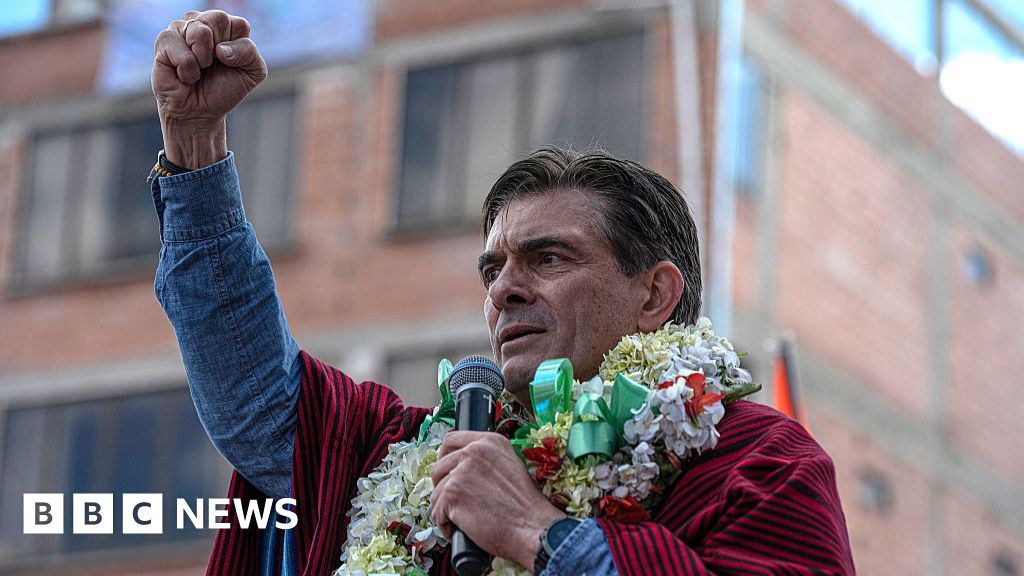
Centrist Rodrigo Paz elected in shift to the right
Ione WellsSouth America correspondent, São Paulo
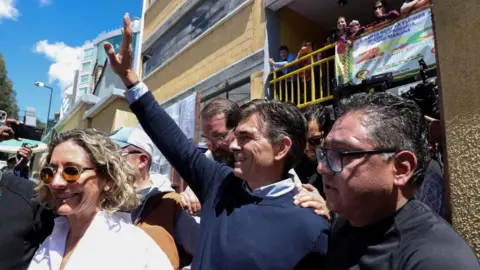 EPA/Shutterstock
EPA/ShutterstockBolivia has elected a centrist senator, Rodrigo Paz, as its next president, bringing an end to nearly 20 years of continuous rule by the Movement for Socialism (Mas) party.
With almost all votes counted, Paz, of the Christian Democratic Party, defeated right-wing candidate Jorge “Tuto” Quiroga in Sunday’s run-off election with a share of 54.6%.
A severe economic crisis and infighting within Mas, which has dominated Bolivian politics since 2006, saw many voters wanting change.
Paz has said he will end fuel shortages and address Bolivia’s wider economic problems. In his victory speech, he said he would open up Bolivia to wider international investment and stimulate private-sector growth.
Paz, 58, went from being a surprise frontrunner in the first round of the election in August to achieving a clear win over Tuto Quiroga, who received 45.4% of the votes in the run-off.
The candidate for Mas did not make it into the run-off.
Paz is perceived as relatively moderate and centrist compared to his opponent, making him more attractive to undecided and disillusioned left-leaning voters, who wanted change but did not want to cast their vote for Quiroga.
Quiroga has conceded defeat and has called his rival to congratulate him.
Paz’s supporters took to the streets of La Paz, the country’s administrative capital, to celebrate the result.
One of them told AFP news agency “we came to celebrate the victory with great hope of a new direction for Bolivia”.
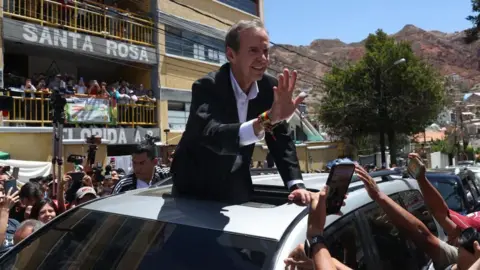 EPA/Shutterstock
EPA/ShutterstockBolivia is grappling with severe shortages of fuel leading to long queues at petrol stations, a shortage of US dollars, and soaring inflation. Natural gas exports, which were once a major source of revenue for Bolivia, have also plummeted.
Paz campaigned with the slogan “capitalism for all”, promising free-market reforms and a commitment to help the poorest in society with social programmes.
He has pledged to ease access to credit for small businesses, lower certain taxes, reduce import tariffs, crack down on corruption, and decentralise the government.
He has also been clear that once in power, he plans to cut fuel subsidies, which he says are unsustainable.
The subsidies have kept fuel prices relatively low but – because they mean that fuel is being sold at prices below import costs – have also lead to shortages and huge queues at pumps.
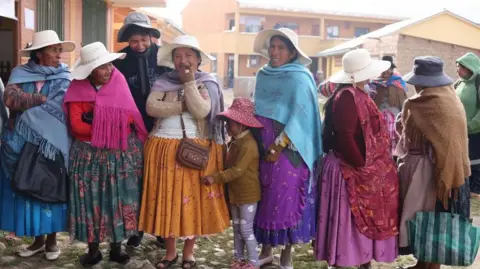 EPA/Shutterstock
EPA/ShutterstockBolivia has been relatively isolated on the world stage in recent years but Paz’s election victory could signal a thawing of relations between Bolivia and the United States, which have not had a formal diplomatic relationship since 2008.
Relations between the two countries have been strained since 2008 when Bolivia’s then-president Evo Morales expelled the US ambassador and the Drug Enforcement Administration (DEA) for allegedly conspiring against his government.
The US has repeatedly accused Bolivia, one of the world’s top producers of cocaine, of not meeting its anti-narcotics obligations, and has long criticised its recognition of Venezuela’s president Nicolás Maduro, whose last election was widely condemned internationally as being neither free nor fair.
Reacting to Paz’s election win, the US State Department said it looked forward “to partnering with President-elect @Rodrigo_PazP to restore economic stability, expand private-sector growth, and strengthen security”.
Once he takes office, Paz may make the calculation that distancing the country from allies including Venezuela and Cuba could help rebuild relations with US.
Regarding China, an important trade partner for Bolivia which is the source of many imports and a key destination for Bolivia’s minerals and lithium exports, Paz will likely try to secure new foreign investment and exports.
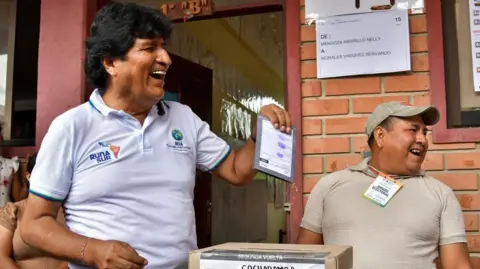 Reuters
ReutersPaz’s choice of running mate is thought to have helped him attract working-class voters and Bolivian’s frustrated with government corruption.
A former police captain, vice president-elect Edman Lara is known for his humble upbringings and whistleblowing on police corruption. He also a strong social media following.
In the months leading up to the vote, Mas’s popularity had been undermined by bitter divisions between two of its best known figures: the former president, Evo Morales, and the outgoing president, Luis Arce.
Morales, who governed from 2006-2019, was disqualified from running in this election due to a ruling that limits presidents to two terms in office. As Morales has served a total of three terms as president – one before the constitutional two-term limit came into force – he was not able to stand again for the top job.
Accused of statutory rape and fathering a child with a teenager – allegations he denies and says are politically motivated – he has been living in his stronghold of Chapare, where he is protected by his loyal supporters who have at times staged protests and roadblocks around the country leading to clashes.
As voting is mandatory in Bolivia, he urged his supporters to spoil their votes rather than cast a ballot paper for either of the two candidates in the run-off.
For many Bolivians, this election result reflects a desire for change and renewal. But Paz inherits tough economic circumstances and a bitterly divided country.
Restoring economic credibility and uniting a country polarised into many factions after years of political turmoil will not be an easy task.
Paz will take office on 8 November 2025.
First Appeared on
Source link







